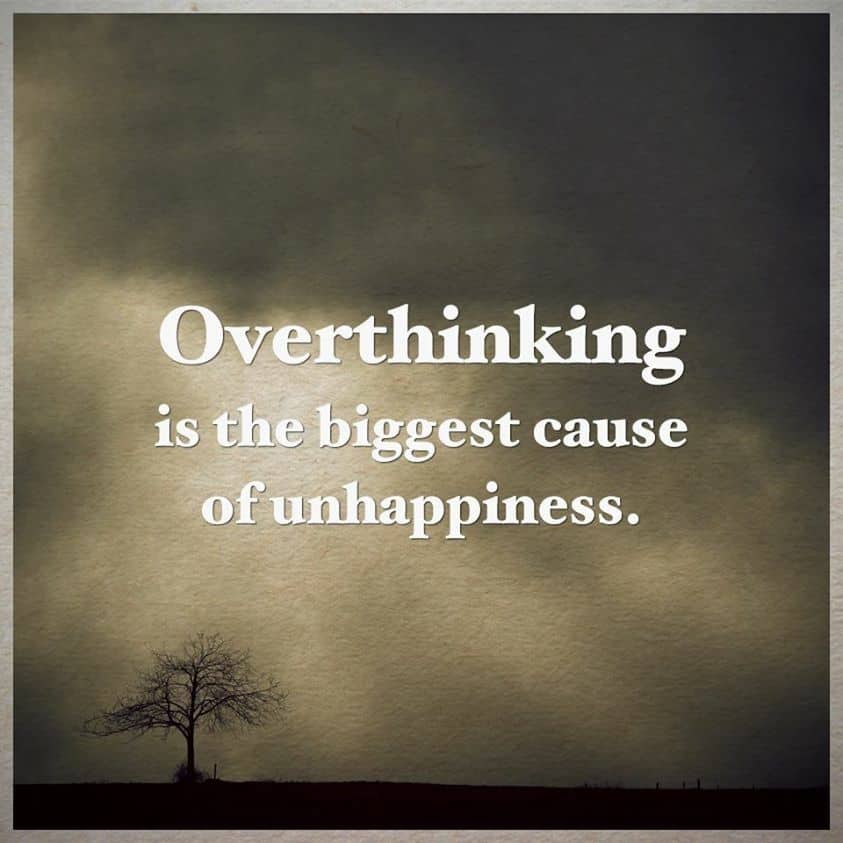Are you a victim of catastrophic thinking? Perhaps you have this terrible habit, but you don’t realize what it is. When you’re faced with a situation, do you always jump to the worst possible conclusion?
The underlying factor behind most of these thoughts is a generalized anxiety condition. Your anxiety levels rise to unprecedented proportions when things are outside of your comfort level. Remember, when you’re dealing with anxiety, it can make you think and feel untrue things.
Have you ever had a panic attack and thought for sure that you had a heart attack instead? Anxiety can cause the body to go into fight or flight mode, and much of your catastrophic thinking could be coming from this underlying condition.
Cognitive Distortion
 You’re catastrophizing, which is experiencing cognitive distortion. This misrepresentation occurs when you have little information, and your mind automatically jumps to the worst explanation. While it can be a bit upsetting not to have all the data you need, it’s not always a catastrophic event.
You’re catastrophizing, which is experiencing cognitive distortion. This misrepresentation occurs when you have little information, and your mind automatically jumps to the worst explanation. While it can be a bit upsetting not to have all the data you need, it’s not always a catastrophic event.
It all comes down to negative thinking. If you feed this monster, it will spin out of control in your life. The smallest of things can trigger significant fear. Let’s examine a couple of scenarios to help you see how this distorted thinking can control your life.
Here Are Three Hypothetical Situations That Illustrate Catastrophic Thinking
Look at these three scenarios to get a better picture of what catastrophizing looks like.
The Threat of An Accident
Linda’s son is late coming home from work. He always walks through the door at 5:30 pm. She catches a news alert that tells her there’s a wreck on I-95. Knowing her son uses this freeway, her mind automatically thinks the worse.
She calls him time and again but gets a voicemail. By the time her son returns her call, she’s already started calling the police department and hospitals to see if her son has been in an accident.
* Linda caused herself great pain and torment because her mind automatically assumed it was her son in this incident. Thankfully, her son was fine, but it took her all night to calm back down.
Waiting For His Pink Slip
Jeffry received an email from his boss to be in his office at 8 am for a meeting. Since his boss usually doesn’t call such meetings, Jeffry immediately starts to panic. He knows that he is going to be fired.
All night he couldn’t sleep, and he wakes up feeling nauseated and anxious. He makes it to work and can barely get his composure to make it to his boss’s office. Once inside, he is congratulated for his help on a project, and the boss gives him a healthy bonus check.
* Jeffry didn’t do anything wrong. Just because the meeting was out of the ordinary didn’t mean he was in trouble. Actually, he was being rewarded.
Avoiding Tax Problems
Using her informed mail delivery service, Bonnie sees that she has a letter from the IRS. Her heart drops to the floor, and she begins to panic. She knows she is being audited and going to go to jail.
Being a small business owner, she replays all the deductions she took in her mind. She races to the door when the postman walks by her house. The letter was just a formality and telling her about a refund they owe her of $12.00.
* Bonnie was getting a refund, not a jail sentence. If she had just waited till the letter arrived, she would have never had all these false scenarios racing through her mind.
Do you see how the smallest of things can make someone jump to these outlandish conclusions? It’s all because of catastrophic thinking caused by cognitive distortion. So, how do you know if you have this condition?
12 Signs the You Struggle with Catastrophic Thinking
So, you’ve read the accounts of others who have struggled from this distorted version of thinking. Now, it’s time to see if you have some similar traits as these people. Here are the most commonly observed behaviors in someone who engages in the unhealthy practice of catastrophic thinking.
1. The News and Social Media Stresses You Out
While you would love to watch the news or engage with friends on social media, it stresses you out. You can’t handle all the negativity as it sends your anxiety soaring. A Taiwanese psychological study confirms that stress and catastrophic thinking often walk hand-in-hand.
2. You Are Stuck in The Past
You’ve had something traumatic that’s happened to you, and you can’t get over it. No matter how hard you try, your past is ruining your future. You replay these events in your mind like a loop.
 3. Your Favorite Word Is No
3. Your Favorite Word Is No
When your kids or spouse ask you to go anywhere, the answer is always no. You are so worried about what might happen to them or that you prefer to stay in your home. If you don’t watch, behaviors like these can cause you to become agoraphobic.
According to the National Institute of Health, agoraphobia is characterized by extreme anxiety that being in a public place won’t allow you to escape. People often shut themselves in their homes to try to protect themselves from impending doom.
4. Your Routine Must Be Written in Stone
Your routine must be the same every day. If there is an alleviation from your schedule, you become very anxious. When everything goes as it should, you can function with ease.
5. You Exaggerate
When you retell a story, you always add a little flair to it. It’s not that you’re trying to lie to others; it’s that your mind automatically replays your thoughts and feelings on the matter, which may be a bit twisted.
6. Adventure is Not for You as You Prefer Certainty
Throwing caution to the wind and being adventurous is not your thing. You are so nervous when things don’t go according to your schedule that you cannot enjoy yourself. You like certainty, even when it comes to vacation.
Consequently, you may find yourself going to the same vacation spot, staying in the same cabin, and eating at the same restaurants. Certainty brings you comfort in life, and anything out of the ordinary causes your anxiety to soar.
7. You Overthink Everything
You tend to overthink, and this learned behavior could cost you friendships and even jobs. The key to this problem is that you’ve had past failures that you’re afraid to repeat. So, you’re too cautious, and you analyze everything.
8. You’re Always Asking “What If Questions.”
When you consider anything, you play 20 questions in your mind. When your spouse wants to put the home on the market, you have many “what if” questions that paralyze you with fear?
What if the house sells too quickly and you have nowhere to go? What if the home has issues that are found in the inspection that you don’t know about? Sometimes you must trust your gut instincts and jump.
9. You Rehash Conversations
A conversation can drive you mad as you will try to remember and rehash parts of it. You may even download a phone recording app so that you can replay conversations to put your mind at ease. You analyze each word trying to see if someone was trying to tell you something or if you missed a few things.
10. You Worry Constantly
You lie in bed at night and worry about everything. You’re not only contemplating your tomorrow, but you’re worried about bills, relationships, and your health. In the olden days, they called people who always worried “Worry warts.”
You’re so afraid of getting out of your comfort zone that you’re becoming paralyzed by your fears.
11. You Only See Things Your Way
A big problem with your catastrophic thinking is that you cannot see anyone else’s point of view. If your mind is jumping to conclusions and someone tries to talk you back into reality, you can’t see things from their perspective. You tend to be very assured in your beliefs, and you don’t like anyone else trying to tell you anything differently.
12. Your Moods Fluctuate
Part of disorganized thoughts is mood fluctuations. It’s only natural that you would become a bundle of nerves when you think a loved one has been in a wreck or some other dangerous situation. Your anxiety is ruining your life, and it can cause you to feel all sorts of emotions.
When your anxiety is at its highest, you might yell and scream at others. When things are normal every day, you might be the kindest person on the earth. However, when you feel duress and like things are out of control, then you can be a force to be reckoned with. According to the National Institute of Health, anxiety disorders often cause people to feel restless, wound-up, or on-edge, making everyone around you feel uncomfortable.
Ways to Combat Catastrophic Thinking
Now that you’ve identified a problem with your thought processes, here are some ways that you can combat it.
- Get an appointment with a counselor and try cognitive behavioral therapy.
- Recognize when these disorganized thoughts enter your mind and use self-talk to bring you back to reality.
- Engage the help of family and friends to assist you in distinguishing between fact and anxiety.
- Ease gradually out of your comfort zone and start living again.
- Learn meditation techniques to calm your body-mind-spirit when you feel chaos in your mind.
 Final Thoughts on Catastrophic Thinking
Final Thoughts on Catastrophic Thinking
Everyone is guilty of catastrophic thinking at some point in time. It’s human nature to worry a little bit. The problem occurs when your worries and fears take over your life. It would help if you learned how to silence the chaos that tries to take over your mind so that you can have some peace.
Learning some practical coping techniques for dealing with the parts of this disorder that are anxiety-based. Additionally, if you have things that happened to you as a child or traumas from the past, you must address them. Your history could be keeping you from a bright future, and it’s time to manage the destructive thought processes that are holding you back.

















